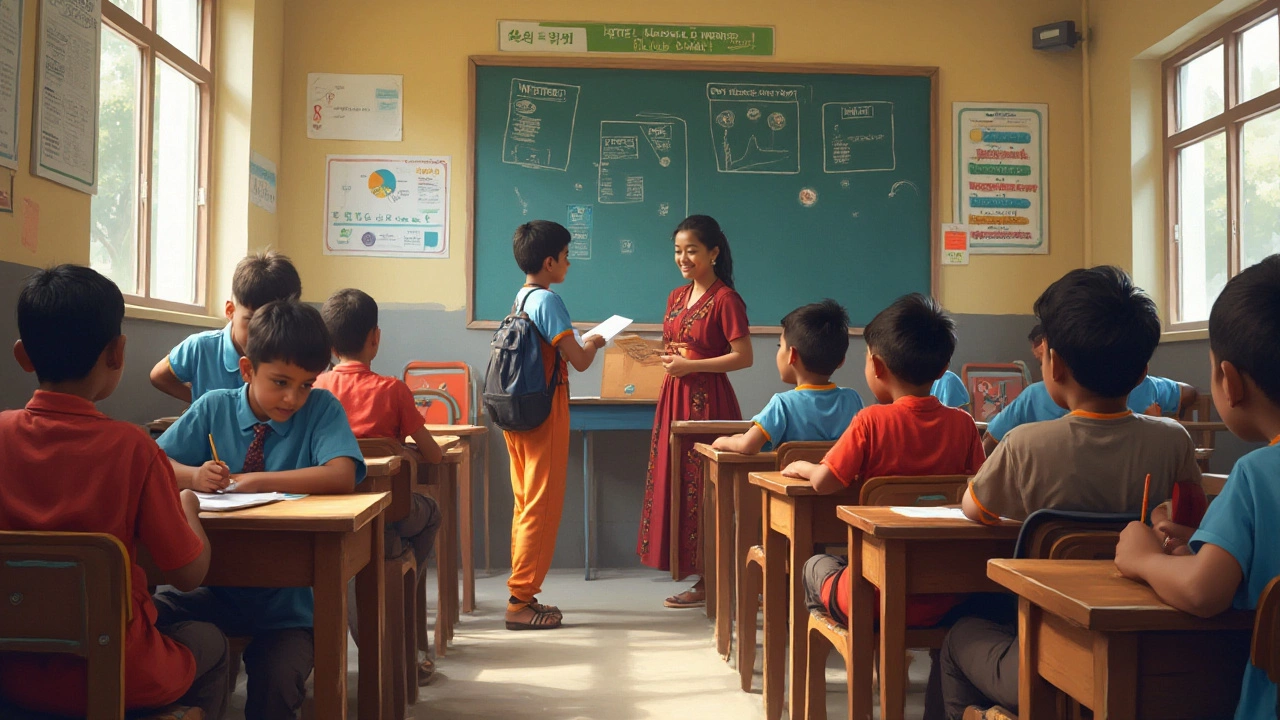Education is a cornerstone of personal and societal growth, but not all education systems are created equal. Across the globe, countries employ varying levels of rigor and complexity in their academic curriculums. The Central Board of Secondary Education (CBSE) in India is frequently highlighted for its challenging and comprehensive approach.
This discussion seeks to understand what sets tough education systems apart and why the CBSE syllabus is often mentioned in this context. By delving into the nuances of challenging curriculums, we'll explore their impact on students and the skills they cultivate. Whether you're a teacher, student, or simply curious about global education dynamics, this exploration will shed light on what makes some education systems more demanding than others.
- Understanding Education System Rigor
- CBSE Syllabus Structure
- Comparative Analysis with Other Systems
- Students' Experience and Challenges
- Impact on Future Opportunities
- Tips for Navigating Rigorous Curriculums
Understanding Education System Rigor
Diving deep into the landscape of global education, the term 'rigor' is used frequently to describe curriculums that demand both depth and breadth. An education system's rigor doesn't just come from a long list of subjects; it emerges from the intensity and quality of its delivery. It demands consistent engagement from students and educators, a robust method of evaluation, and a curriculum designed to push intellectual boundaries. When we talk about rigor, there's an implicit challenge not only to memorize but to understand, analyze, and apply knowledge. That’s why countries noted for their rigorous systems often produce graduates well-equipped for complex problem-solving and innovation.
The level of rigor can be influenced by cultural perceptions of education's role in society. In nations like India, education is seen as a key to unlocking future opportunities, and systems such as the CBSE syllabus reflect this philosophy. Structured to develop critical thinking and analytical skills, the CBSE syllabus places a strong emphasis on science and mathematics, with its textbooks designed to foster conceptual understanding. This commitment can be daunting for students, but it helps inculcate a disciplined academic routine that many benefit from later in life.
Contrast this with Finland, where educational rigor is crafted through a balance of academic and holistic development. Finnish systems prioritize student well-being alongside academic achievements, integrating artistic and vocational subjects early on. The success of Finnish students in global PISA (Programme for International Student Assessment) rankings often surprises those who equate rigor solely with factual learning. As Pasi Sahlberg, a Finnish educator, aptly put it:
"Finnish schools do less homework, have fewer tests, and yet they achieve more – it’s about being effective rather than excessive."This highlights that rigor can also embody the principle of 'working smarter, not harder', and raises questions about the nature of traditional educational approaches.
Some education systems integrate technological advancements to enhance rigor, utilizing sophisticated digital tools to craft lessons that are both challenging and interactive. Singapore is often recognized for seamlessly weaving technology into its educational fabric, creating tech-savvy environments where students learn coding alongside languages. A global benchmark for education quality, Singapore’s system is methodically updated to stay relevant in an ever-evolving world. Universities and employers often view graduates from these systems as more ready for the technological demands of modern workplaces.
From South Korea's relentless pursuit of academic excellence to the exam-oriented approach in Japan, educational rigor across the globe is varied and multifaceted. While some of these systems are lauded for cultivating knowledgeable individuals, they are also critiqued for the stress and pressure they place on students. Understanding the balance—between rigorous demands and student well-being—is crucial as we consider how to prepare youth for the future. Each system has its strengths and drawbacks, echoing not just educational ideals but societal values too.
It’s vital to consider these different approaches when assessing the 'toughest' education systems. What might be exceedingly rigorous for some might simply be educationally efficient for others. Ultimately, a nation that nails the balance leads its students to both academic success and personal growth.
CBSE Syllabus Structure
The CBSE syllabus is renowned for its meticulous and well-planned structure aimed at developing a student's cognitive and analytical capabilities. Anchored by a solid framework set by the Central Board of Secondary Education, this curriculum is widely implemented across schools in India and a few select countries. It seeks to balance theoretical knowledge with practical application, providing a holistic education experience. A significant aspect of the CBSE system is its emphasis on understanding concepts instead of rote learning, ensuring students not only acquire knowledge but comprehend the underlying principles and logic.
At the primary and secondary levels, subjects range from languages, mathematics, science, and social studies to a variety of electives like environmental education and computer science. The program is designed to scaffold learning in a progressive manner. For instance, the math syllabus evolves from the fundamentals of arithmetic in early grades to the complexities of calculus and statistics in higher classes. Science subjects such as physics and chemistry are layered with laboratory sessions to facilitate practical understanding, while languages nurture literary and communication skills. Such a comprehensive syllabus prepares students thoroughly for higher education and competitive exams.
"The CBSE's approach prioritizes depth over breadth, ensuring students develop a profound understanding of essential topics. This methodology is reflected in the board exams, which are crafted to challenge students’ comprehension and analytical skills rather than just memorization,” noted a report from India’s Ministry of Education.
A distinctive feature of the CBSE syllabus is its alignment with national standards and competitive examinations like the JEE and NEET, which are entrance exams for engineering and medical schools, respectively. This integration allows students to better prepare for these significant assessments right from the school level. Additionally, the CBSE continually updates its syllabus to reflect contemporary trends and advancements, ensuring relevance and applicability in a modern context. This dynamic aspect of the syllabus encourages both educators and students to stay updated with current developments, fostering an atmosphere of lifelong learning.
A 2022 survey indicated an 87% positive feedback from students and educators about the CBSE syllabus, highlighting its effectiveness in building a strong academic foundation. The structured nature of the syllabus demands dedicated study habits, but numerous support systems are available, including digital learning tools, supplementary books, and adaptive tutorials that cater to diverse learning styles. While challenging, these resources aid students in managing their workload effectively and comprehensively understanding the curriculum, ultimately equipping them for various academic and professional pursuits.

Comparative Analysis with Other Systems
When discussing the global landscape of education, it's fascinating to observe how different national systems sculpt their curriculums to address their unique cultural and academic objectives. The Central Board of Secondary Education (CBSE) in India stands out as a beacon of rigor and structured learning. Comparing the CBSE with schooling systems from, say, Finland, Japan, or the United States, reveals significant variances in not just academic priorities but also in pedagogical approaches. In many ways, these differences provide a snapshot of a country's societal values and the skills they prioritize for future generations.
Take Finland, for instance; it boasts an education system that's often lauded for its student-centered approach, contrasting sharply with India's CBSE, which emphasizes volume and breadth of academic knowledge. Finnish schools focus on minimal homework and longer class periods for creative exploration, nurturing a student's love for learning rather than rote memorization. Meanwhile, CBSE schools typically champion a comprehensive understanding of subjects, encouraging students to excel in standardized exams—a trademark of academic toughness.
Japan, with its rigorous system, shares similarities with India's emphasis on examinations. Yet, Japan prioritizes group harmony and discipline, with students often attending juku or cram schools after regular classes to prepare for high-stakes testing, akin to the pressures CBSE students face during board exams. The difference lies in the social fabric that supports intense study in Japan compared to India's focus on academic excellence as a path to professional success. "Academic systems globally reflect not only education but a society's culture and ambition," notes Dr. Eleanor Westfield of the International Education Forum, highlighting the diversity in international education motives.
On the other hand, the American education system, particularly public schooling, presents a stark contrast. It offers a broader array of elective courses, and places flexibility over stringent standards. While this allows for a well-rounded exploration of various interests, critics argue it sometimes lacks the academic depth found in CBSE. Yet, the American style promotes critical thinking and skills application, preparing students for diverse career paths with an emphasis on extracurricular engagements.
To distill these complexities into a comparative overview may be challenging, but it's apparent that each system—with CBSE being a core example of a robust framework—sets the stage for specific virtues: rigorous knowledge acquisition in India, creativity and well-being in Finland, discipline and collaboration in Japan, and flexible exploration in the United States. Understanding these differences can inform how students, educators, and policymakers navigate the intricate tapestry of global education.
This comparative analysis not only highlights the challenges and opportunities presented by each system but also underscores a critical fact: there is no singular 'best' education model. Each has merits and downsides, shaping learners in ways that align with the larger goals and fabric of society. Whether you're partaking in the meticulous discipline of CBSE, the open-ended inquiry of Finland, or the balanced pursuit of varied interests in the US, the road to learning remains as diverse and dynamic as the students it aims to guide.
| Country | Focus | Attributes |
|---|---|---|
| India (CBSE) | Academic Depth | Emphasis on exams, structured curriculum |
| Finland | Student Well-being | Minimal homework, creative learning |
| Japan | Discipline and Memorization | High-stakes testing, after-school juku |
| USA | Critical Thinking | Flexible curriculum, diverse extracurriculars |
Students' Experience and Challenges
The journey through the rigorous education systems of the world, particularly the Central Board of Secondary Education (CBSE) in India, is marked with unique sets of experiences and challenges that shape students' academic and personal growth. Known for its strict and comprehensive curriculum, CBSE demands a high degree of dedication and discipline from students. The academic year is structured around pivotal examinations that often determine the trajectory of a student's higher education opportunities. Students often describe the examination phase as both demanding and rewarding, where the intricate balance of maintaining consistency is critical. Many report intense study periods leading up to these exams, which not only tests their grasp of the syllabus but also their time management skills and resilience under pressure.
Students navigating CBSE often face the challenge of covering a vast amount of content across various subjects, which requires developing efficient learning strategies. The syllabus emphasizes not just rote memorization but a deeper understanding and application of concepts. This foundational emphasis equips students with critical thinking abilities; however, the pressure to perform well can sometimes overshadow the learning experience. The psychological stress associated with meeting expectations is a common thread among students, and schools often implement mentorship programs to help students adapt. As one educator noted, "CBSE trains students to handle pressure and think critically," which reflects the intricate balance of challenges and rewards embedded within this education system.
Group study sessions and digital resources have become indispensable tools for students’ success, allowing for collaborative learning and wider access to diverse study materials. Many students participate in study groups to navigate difficult topics, sharing different perspectives and developing collaborative problem-solving skills. Online platforms have bridged educational gaps by offering tutorials that aid understanding outside traditional classrooms, a shift that has become more prominent with advancements in technology. However, not all students have equal access to these tools, which sometimes creates disparities in academic performance.
The physical and mental demands of navigating a tough education system like CBSE often teach students unparalleled discipline and resilience. These experiences often translate into improved problem-solving skills, a solid work ethic, and adaptability in complex situations—skills highly valued in higher education and future careers. Recognizing these challenges, educational institutions continue to evolve, integrating supportive measures to foster not only academic excellence but holistic student well-being. Initiatives like peer support networks and mental health workshops are gradually becoming integral components of such syllabuses, demonstrating a shift towards more inclusive and supportive learning environments.

Impact on Future Opportunities
The rigors of the education systems globally have a significant impact on students' future opportunities, shaping them in ways that extend beyond academics. In particular, those who navigate challenging curricula like the CBSE syllabus in India often find themselves better equipped for higher education and competitive careers. The robust framework and comprehensive content prepare students not just for exams, but for life, cultivating skills like critical thinking, time management, and perseverance. As students engage with demanding subjects and often unfamiliar concepts, they learn to adapt, an invaluable skill in today's ever-changing global job market.
Many graduates from rigorous systems find they have a competitive edge when applying to top universities worldwide. Admissions officers often recognize the dedication and high level of understanding that rigorous curriculums require, marking such students as well-prepared for the challenges of tertiary education. Specifically, the analytical abilities and subject matter expertise honed through tough education pathways facilitate higher acceptance rates at elite institutions, opening doors to myriad future endeavors. Notably, a study by a renowned education think tank highlighted that students from challenging educational backgrounds are 40% more likely to receive scholarships for advanced studies.
Additionally, the structured nature of systems like the CBSE doesn't merely prepare students for academic success—it also cultivates a resilience that benefits them throughout their careers. Many employers value the inherent tenacity and problem-solving skills found in those who have faced and overcome academic challenges. According to a 2022 survey conducted by a leading employment agency, employers noted that candidates from rigorous educational systems performed better in stress management and decision-making roles. This key insight provides an assurance that the investments made during school days yield dividends in the corporate world.
"The rigor and depth of education systems like the CBSE significantly empower students, transforming challenges into growth opportunities," remarked Dr. Sushil Kumar, educational expert and author, emphasizing the broader implications of demanding curriculums.
Lastly, navigating a challenging curriculum fills students with a sense of accomplishment and capability that cannot be understated. The personal benefits of overcoming academic hurdles are just as profound as the professional. By completing a challenging education, students often feel empowered and ready to tackle the unknown, confident in their ability to learn and grow continuously. Thus, these systems not only impact their future opportunities in measurable ways but also influence their pursuits with an enduring sense of confidence and capability, making them lifelong learners and leaders in whatever fields they choose to explore.
Tips for Navigating Rigorous Curriculums
Dealing with challenging education systems like the CBSE syllabus requires not only academic intelligence but also strategic planning and emotional intelligence. It's crucial for students to develop effective study habits early on. One significant method is time management; allotting specific times for each subject can prevent cramming and reduce stress. Students should create a balanced schedule, ensuring that there’s room for relaxation and extracurricular activities, which play a vital role in reducing burnout and maintaining mental health. When working through a demanding curriculum, it's beneficial to break down large tasks into manageable parts. This step-by-step approach not only makes challenging tasks more approachable but also boosts confidence as each small objective is achieved.
Another key to excelling in rigorous curriculums is understanding the 'why' behind what you're studying. This intrinsic motivation can lead to deeper learning and retention of information. Students should make a habit of asking questions and exploring beyond the textbooks to gain a holistic understanding of topics. This practice nurtures critical thinking and curiosity, skills that are essential for success. Utilizing resources like online courses, study groups, and educational apps can provide different perspectives and make learning more interactive and engaging. It's also important for students to develop a healthy relationship with failure. Viewing setbacks as opportunities for growth rather than obstacles builds resilience, which is crucial in demanding academic environments.
A structured approach to preparation can make navigating a tough educational framework like the CBSE curriculum more manageable. Creating concise, focused notes during classes can save time and effort when revising for exams. Practicing past papers helps familiarize students with the exam format, honing time management skills during tests. Students should regularly seek feedback from teachers to identify areas that need improvement and understand their progress. Regular self-assessment encourages autonomous learning and helps students take responsibility for their education.
Ensuring a support system is in place can dramatically impact a student's ability to handle a challenging curriculum. Open communication with family and friends provides a safe space where students can express concerns and seek advice. Joining study groups fosters a sense of community and shared goals, which can be highly motivational. Many schools offer counseling services; taking advantage of these resources can alleviate the emotional toll of a demanding syllabus. Acknowledging that pressures can be intense is vital; mindfulness practices, such as meditation and deep breathing exercises, can contribute significantly to managing stress and maintaining focus.
"Persistence and resilience only come from having been given the chance to work through difficult problems." — Gever Tulley
In summary, while navigating a rigorous education system like those found in countries with the toughest curriculums may be daunting, combining effective study strategies, leveraging resources, cultivating a positive mindset, and maintaining a strong support network can vastly improve a student's experience and outcomes. Focusing on both academic and personal growth ensures that students emerge from these systems well-rounded and ready to face future challenges.
